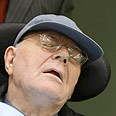
For many Holocaust victims former Nazi guard John Demjanjuk's trial provides perhaps one of the last big opportunities to expose to public scrutiny the crimes committed in World War II death camps.
The trial of Demjanjuk, 89, on charges he helped to force 27,900 Jews into gas chambers at Sobibor camp in 1943 started on Monday under the international media spotlight. He has denied involvement in the Holocaust.
"I didn't come to take revenge on Demjanjuk. I came to explain what it was like in Sobibor," said plaintiff Thomas Blatt, whose family was killed at the camp in 1943 and who at 15 was ordered to sort out belongings of Jews sent to be gassed.
"Today is important because it is the last big international case that everyone is interested in."
Demjanjuk, a former US carworker, was pushed in a wheelchair with a headrest before the court at what is likely to be Germany's last major trial from the Nazi era.
There are others who have travelled to the court in Munich who see the trial as a platform to remind the world of the Nazi gas chambers. The trial was delayed because of the number of attendees packed into the court.
David van Huiden, 78, whose Dutch Jewish family was gassed at Sobibor death camp in Poland, said he had wanted to attend the trial to see justice done.
"The trial is symbolic for society. For German society and Dutch society. Too many people did not help," said van Huiden, who survived the war in the Netherlands by pretending to be a Christian orphan.
Nazi camps
"A guard in another place, in a jail, or in a concentration camp was guarding so that prisoners couldn't escape," said 82-year-old Blatt. "But a guard in a death factory, an extermination camp was a murderer. He helped murder people."
Blatt is not doing this out of revenge or to be compensated, his lawyer Stefan Schuenemann said.
"Mr Blatt thinks that after such a long time it is too late for atonement, the lawyer said, adding:
"Mr Blatt doesn't really care about Demjanjuk's fate. It is important for him that the story of Sobibor... is today given a platform so that he can describe the terrible murders that were carried out in this extermination camp 66 years ago."
Robert Cohen, 83, a co-plaintiff and survivor from the Auschwitz camp in southern Poland with a six-digit identification number tattooed on his arm, said he felt positive about the proceedings.
"I'm here because it is the duty towards my parents and my brother and for millions of others who were murdered by the Nazis," said Cohen, who was in Auschwitz for 11 months and was in concentration camps for a total of 27 months.















